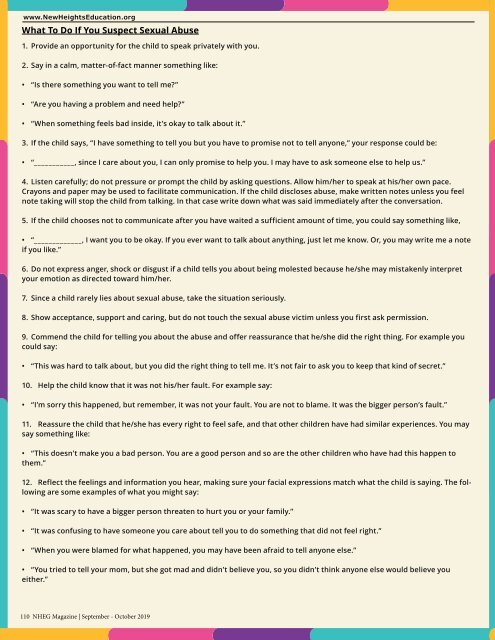NHEG-Magazine-September-October
Create successful ePaper yourself
Turn your PDF publications into a flip-book with our unique Google optimized e-Paper software.
www.NewHeightsEducation.org<br />
What To Do If You Suspect Sexual Abuse<br />
1. Provide an opportunity for the child to speak privately with you.<br />
2. Say in a calm, matter-of-fact manner something like:<br />
• “Is there something you want to tell me?”<br />
• “Are you having a problem and need help?”<br />
• “When something feels bad inside, it’s okay to talk about it.”<br />
3. If the child says, “I have something to tell you but you have to promise not to tell anyone,” your response could be:<br />
• “___________, since I care about you, I can only promise to help you. I may have to ask someone else to help us.”<br />
4. Listen carefully; do not pressure or prompt the child by asking questions. Allow him/her to speak at his/her own pace.<br />
Crayons and paper may be used to facilitate communication. If the child discloses abuse, make written notes unless you feel<br />
note taking will stop the child from talking. In that case write down what was said immediately after the conversation.<br />
5. If the child chooses not to communicate after you have waited a sufficient amount of time, you could say something like,<br />
• “_____________, I want you to be okay. If you ever want to talk about anything, just let me know. Or, you may write me a note<br />
if you like.”<br />
6. Do not express anger, shock or disgust if a child tells you about being molested because he/she may mistakenly interpret<br />
your emotion as directed toward him/her.<br />
7. Since a child rarely lies about sexual abuse, take the situation seriously.<br />
8. Show acceptance, support and caring, but do not touch the sexual abuse victim unless you first ask permission.<br />
9. Commend the child for telling you about the abuse and offer reassurance that he/she did the right thing. For example you<br />
could say:<br />
13. Truthfully respond to any question, yet do not make promises you cannot keep. For example you could say:<br />
• “I am not sure what will happen, but I will be here for you at school.”<br />
www.NewHeightsEducation.org<br />
14. Follow the school procedure based on the state standard for reporting abuse. Tell the child the next step you will take. Say<br />
something like:<br />
• “I will call a person whose job it is to keep children safe. The person will come to listen to you tell what happened. Then you<br />
will be asked some questions. You must answer them truthfully. Can you do that?”<br />
• If the child says “Yes,” reinforce the decision by saying,<br />
• “Good. That is exactly what you need to do to keep yourself safe.”<br />
• If you sense that a child is unsure, you could say,<br />
• “___________, you have been hurt and if you don’t tell about what happened, this person may hurt other children. Do you<br />
think you can tell the truth when you answer the questions?”<br />
15 As soon as possible report the conversation to the appropriate authority.<br />
16. Keep the meeting with the child confidential; do not mention it to anyone who is not professionally involved.<br />
17. Treat the child normally at school showing the same respect and caring you show every student. Help the child meet his/<br />
her basic psychological needs to feel accepted, safe, secure, and a sense of belonging. Validate him/her by noticing and commenting<br />
on his/her positive attributes.<br />
18. Make sure there is follow through and that the child receives support and assistance.<br />
Using the video DVD, “Kelly Bear Teaches About Secret Touching,” may be helpful. Click here to see all the Kelly Bear Life Skills<br />
Education DVDs at www.kellybear.com.<br />
• “This was hard to talk about, but you did the right thing to tell me. It’s not fair to ask you to keep that kind of secret.”<br />
10. Help the child know that it was not his/her fault. For example say:<br />
• “I’m sorry this happened, but remember, it was not your fault. You are not to blame. It was the bigger person’s fault.”<br />
11. Reassure the child that he/she has every right to feel safe, and that other children have had similar experiences. You may<br />
say something like:<br />
• “This doesn’t make you a bad person. You are a good person and so are the other children who have had this happen to<br />
them.”<br />
12. Reflect the feelings and information you hear, making sure your facial expressions match what the child is saying. The following<br />
are some examples of what you might say:<br />
• “It was scary to have a bigger person threaten to hurt you or your family.”<br />
• “It was confusing to have someone you care about tell you to do something that did not feel right.”<br />
• “When you were blamed for what happened, you may have been afraid to tell anyone else.”<br />
• “You tried to tell your mom, but she got mad and didn’t believe you, so you didn’t think anyone else would believe you<br />
either.”<br />
110 110 <strong>NHEG</strong> | GENiUS <strong>Magazine</strong> MAGAZINE | <strong>September</strong> | www.geniusmag.com<br />
- <strong>October</strong> 2019<br />
<strong>September</strong> - <strong>October</strong> 2019 | <strong>NHEG</strong> <strong>Magazine</strong> 111


















